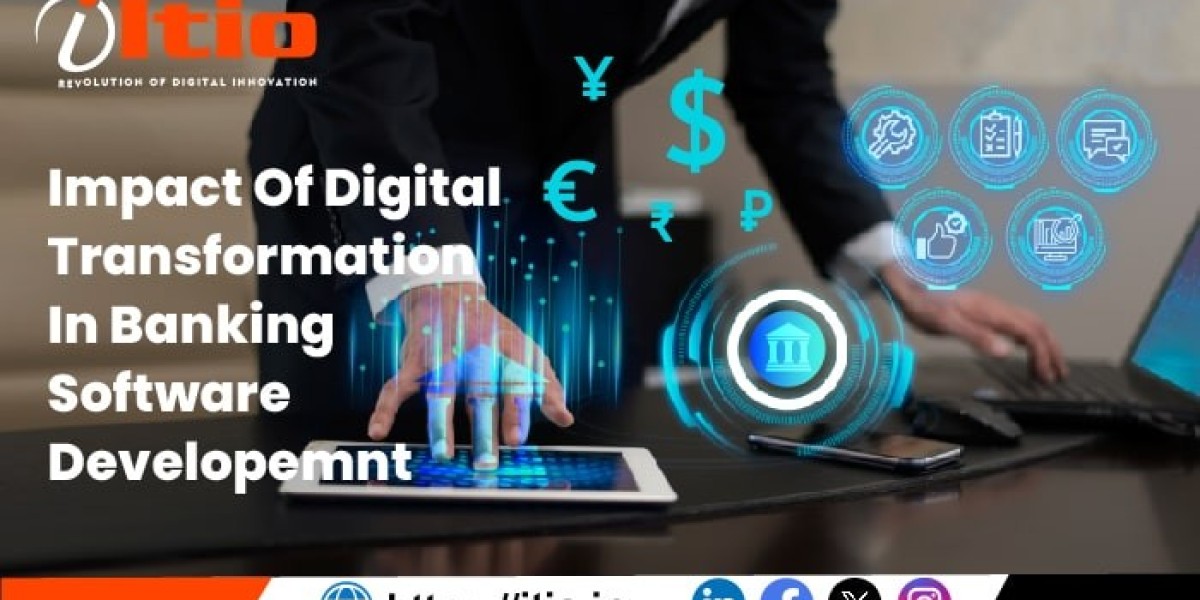In recent years, the banking sector has undergone a profound evolution driven by digital transformation. As financial institutions embrace advanced technologies to enhance operational efficiency, improve customer experiences, and stay competitive, banking software development plays a pivotal role in shaping the industry's future. This article explores the significant impact of digital transformation on banking software development, highlighting key trends, benefits, and considerations for financial institutions partnering with ITIO, a leading provider of banking software development services.
Understanding Digital Transformation in Banking
Digital transformation in banking refers to the integration of digital technologies across all aspects of banking operations, from customer interactions to back-end processes. It encompasses the adoption of artificial intelligence (AI), machine learning (ML), blockchain, cloud computing, and data analytics to innovate traditional banking services and deliver personalized, efficient, and secure financial solutions.
Key Trends Driving Digital Transformation in Banking Software Development
1. Enhanced Customer Experience
Digital transformation enables banks to offer personalized and seamless customer experiences through intuitive digital interfaces, mobile banking apps, and self-service portals. Banking software development focuses on optimizing user journeys, providing real-time access to account information, facilitating instant transactions, and delivering personalized financial advice based on customer behavior and preferences.
2. Operational Efficiency
Automation and digitization streamline internal processes within banks, reducing manual tasks and operational costs. Banking software solutions automate routine tasks such as account opening, loan processing, and regulatory compliance, improving efficiency, minimizing errors, and accelerating time-to-market for new products and services.
3. Data-Driven Insights
Advanced analytics and big data technologies empower banks to harness vast amounts of customer data for actionable insights. Banking software development incorporates predictive analytics, AI-powered algorithms, and real-time dashboards to analyze customer behavior, identify trends, mitigate risks, and optimize decision-making processes across marketing, risk management, and investment strategies.
4. Security and Compliance
Cybersecurity remains a top priority in banking software development services to protect sensitive customer information, financial transactions, and regulatory compliance. Solutions include robust encryption protocols, biometric authentication, fraud detection algorithms, and compliance with regulatory standards such as GDPR and PCI DSS. Digital transformation enhances security measures to safeguard against cyber threats and ensure data integrity.
5. Blockchain and Distributed Ledger Technology (DLT)
Blockchain technology is revolutionizing banking by enabling secure and transparent peer-to-peer transactions, reducing costs associated with intermediaries, enhancing transaction speed, and ensuring immutable records of financial transactions. Banking software development integrates blockchain for applications such as cross-border payments, smart contracts, trade finance, and identity verification.
Benefits of Digital Transformation in Banking Software Development
1. Improved Efficiency and Cost Savings
By automating processes and optimizing workflows, digital transformation reduces operational costs, minimizes human errors, and enhances overall efficiency within banks. Banking software development streamlines back-office operations, accelerates transaction processing, and improves resource allocation, resulting in significant cost savings and increased profitability.
2. Enhanced Customer Engagement and Satisfaction
Digital transformation enhances customer engagement through personalized experiences, omnichannel banking services, and 24/7 access to financial services. Banking software solutions enable seamless interactions across multiple touchpoints, empower customers with self-service options, and deliver real-time insights into their financial health, fostering loyalty and satisfaction.
3. Agility and Innovation
Agile methodologies in banking software development enable rapid prototyping, iterative development cycles, and quick deployment of new features and updates. Banks can adapt to market trends, regulatory changes, and customer demands swiftly, gaining a competitive edge in a dynamic marketplace. Digital transformation fosters a culture of innovation, encouraging experimentation with emerging technologies to drive business growth.
4. Risk Management and Compliance
Advanced analytics and AI-powered algorithms enhance risk management capabilities by predicting and mitigating potential risks in real time. Banking software development incorporates compliance features to ensure adherence to regulatory requirements, automate reporting obligations, and maintain audit trails, reducing regulatory risks and legal liabilities.
5. Scalability and Future-Readiness
Scalable architecture in banking software development accommodates future growth and expansion initiatives. Cloud-based solutions offer flexibility to scale infrastructure, support increasing transaction volumes, and integrate with third-party services and fintech innovations. Digital transformation prepares banks for future disruptions and positions them as leaders in a rapidly evolving industry landscape.
Partnering with ITIO For Banking Software Development Services
ITIO is a leading provider of banking software development services, specializing in custom solutions tailored to meet the unique needs of financial institutions. Our expertise encompasses the development of secure, scalable, and compliant banking software solutions that empower banks to innovate, optimize operations, and deliver superior customer experiences.
Why Choose ITIO?
● Expertise and Experience: With years of experience in banking software development, ITIO has a proven track record of delivering high-quality solutions that meet regulatory standards and exceed client expectations.
● Technological Proficiency: We leverage cutting-edge technologies such as AI, blockchain, cloud computing, and big data analytics to develop innovative banking software solutions that drive business growth and operational excellence.
● Customization Capabilities: ITIO offers bespoke software solutions tailored to address specific challenges and goals of financial institutions, ensuring alignment with strategic objectives and enhancing competitive advantage.
● Security and Compliance: Our banking software solutions prioritize robust security measures and compliance with industry regulations to protect sensitive data, mitigate risks, and uphold trust and transparency.
● Client-Centric Approach: At ITIO, we prioritize client satisfaction by providing proactive communication, transparent project management, and ongoing support throughout the software development lifecycle.
Conclusion
Digital transformation in banking software development represents a paradigm shift in how financial institutions operate, engage with customers, and drive innovation. By embracing advanced technologies, banks can enhance operational efficiency, improve customer experiences, and achieve sustainable growth in a competitive marketplace. Partnering with ITIO ensures access to cutting-edge banking software development services tailored to your institution's unique needs and strategic objectives. Transform your banking operations with ITIO's expertise in developing secure, scalable, and innovative software solutions. Contact us today to learn more about how we can collaborate to accelerate your digital transformation journey and unlock new opportunities for success in the banking industry.








